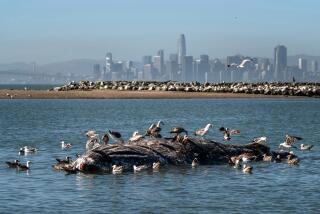7 Puget Sound orcas are presumed dead
- Share via
SEATTLE — Seven Puget Sound killer whales are missing and presumed dead in what could be the biggest decline among the sound’s orcas in nearly a decade, say scientists who track the endangered animals.
“This is a disaster,” said Ken Balcomb, a senior scientist at the Center for Whale Research on San Juan Island. “The population drop is worse than the stock market.”
Though the official census won’t be completed until December, the total number of live “southern resident” orcas now stands at 83.
Among those missing since last year’s count are the nearly century-old leader of one of the three southern resident pods, and two young females who recently bore calves. The loss of the seven whales, Balcomb said, would be the biggest decline among the Puget Sound orcas since 1999.
Low numbers of chinook salmon, a prime food for these whales, may be a factor in the unusual number of deaths this year, Balcomb said.
“It was a bad salmon year, and that’s not good for the whales,” he said. “Everybody considers these wonderful creatures, but we really have to pay attention to the food supply.”
The three pods, or families, that frequent Western Washington’s inland marine waters -- J, K, and L pods -- are genetically and behaviorally distinct from other killer whales. The sounds they make are considered a unique dialect, they mate only among themselves, eat salmon rather than marine mammals and show a unique attachment to the region.
The population reached 140 or more in the last century, but their numbers have fluctuated in recent decades.
They were listed as endangered in 2005.
“We may be in the beginning of another decline in the population,” said Howard Garrett, director of the Orca Network, a nonprofit education and advocacy group.
He said the whales seem to be having a harder time finding chinook salmon.
The whales recently have been traveling greater distances than usual, suggesting they may be ranging farther for food, said Brad Hanson, a wildlife biologist with the National Marine Fisheries Service.
Lack of food may be a concern, but it’s too early to know the reason for the unusual number of presumed deaths, he said.
Pollution and a decline in prey are believed to be the whales’ biggest threats, although stress from whale-watching tour boats and underwater sonar tests by the Navy also have been concerns. In the late 1960s and early ‘70s, dozens were captured for marine parks.
More to Read
Sign up for Essential California
The most important California stories and recommendations in your inbox every morning.
You may occasionally receive promotional content from the Los Angeles Times.










